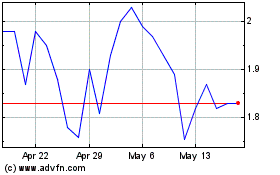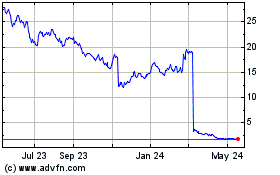- New designation follows the U.S. Food and
Drug Administration (FDA) Orphan Drug Designation for AMX0035 in
Wolfram syndrome granted in 2020
- Topline data for all 12 participants from
Phase 2 HELIOS trial studying impact of AMX0035 on endocrine,
metabolic, and neurodegenerative aspects of Wolfram syndrome
anticipated fall 2024
Amylyx Pharmaceuticals, Inc. (NASDAQ: AMLX) (“Amylyx” or the
“Company”) today announced the European Commission (EC), based on a
positive opinion issued by the Committee for Orphan Medicinal
Products (COMP) of the European Medicines Agency (EMA), has granted
Orphan Drug Designation for AMX0035, Amylyx’ proprietary,
fixed-dose combination of sodium phenylbutyrate (PB) and
taurursodiol (TURSO; also known as ursodoxicoltaurine outside of
the U.S.) for the treatment of Wolfram syndrome.
Wolfram syndrome is a prototypical disease of endoplasmic
reticulum (ER) stress that is rare, progressive, and monogenic and
is characterized by childhood-onset diabetes mellitus, optic nerve
atrophy, deafness, diabetes insipidus, and neurodegeneration. There
are currently no drugs approved for Wolfram syndrome, and many
people with the disease die prematurely with severe neurological
disabilities.
The FDA previously granted AMX0035 Orphan Drug Designation for
the treatment of Wolfram syndrome in 2020. The EMA grants Orphan
Drug Designation status for products intended for the treatment,
prevention, or diagnosis of rare, life-threatening, or chronically
debilitating conditions where the product may represent a
significant benefit over existing treatments.
Amylyx recently presented positive data from an interim analysis
of its Phase 2 HELIOS study, including eight participants with
Wolfram syndrome assessed at Week 24, which demonstrated that
AMX0035 improved pancreatic function and glycemic control, as
measured by C-peptide, HbA1c, and other markers of glucose
metabolism. All eight participants met prespecified responder
criteria showing either improvement or stabilization of disease
according to both the Patient Reported Global Impression of Change
(PGIC) and the Clinical Reported Global Impression of Change (CGIC)
scales. The majority of participants reported some improvement in
vision. In Wolfram syndrome, progressive decline and worsening of
outcomes would have been expected on all measures, so disease
improvement or stabilization alone is clinically meaningful.
AMX0035 was generally well tolerated in all participants. The
Company anticipates reporting topline data from all 12 participants
at Week 24 this fall.
“Wolfram syndrome is a disease where there are well-defined
measurable biomarkers, rigorous supporting preclinical data, and
clear rationale for our potential therapy based on its mechanism of
action. Specifically, Wolfram syndrome is considered a prototypical
endoplasmic reticulum (ER) stress disorder because of the clear
link between WFS1 mutations and ER stress. AMX0035 is believed to
target ER stress and mitochondrial dysfunction,” said Camille L.
Bedrosian, MD, Chief Medical Officer at Amylyx. “The interim data
from HELIOS showed stabilization or even improvement across key
outcomes at Week 24. HELIOS follows strong preclinical research
with data showing clear effects in cellular and animal models. We
look forward to reporting topline data from all participants at
Week 24 this fall. We aim to address an urgent unmet medical need,
given there are no approved treatment options for Wolfram
syndrome.”
About Wolfram Syndrome
Wolfram syndrome is rare, progressive, monogenic disease
characterized by childhood-onset diabetes, optic nerve atrophy, and
neurodegeneration. Common manifestations of Wolfram syndrome
include diabetes mellitus, optic nerve atrophy, central diabetes
insipidus, sensorineural deafness, neurogenic bladder, and
progressive neurologic difficulties. The prognosis of Wolfram
syndrome is poor, and many people with the disease die prematurely
with severe neurological disabilities. Literature suggests
approximately 3,000 people are living with Wolfram syndrome in the
United States.
Wolfram syndrome is often characterized as a prototypical
disease of endoplasmic reticulum (ER) stress. ER stress and
mitochondrial dysfunction are believed to drive the underlying
disease pathophysiology in Wolfram syndrome. Individuals with
Wolfram syndrome generally have mutations in the WFS1 gene, which
encodes wolframin, a protein spanning the membrane of the ER.
Wolframin is thought to play a role in protein folding and aid in
the maintenance of ER function by regulating calcium levels. Loss
of wolframin function leads to ER stress and impaired mitochondrial
dynamics.
About AMX0035
AMX0035 is an oral, fixed-dose combination of sodium
phenylbutyrate (PB) and taurursodiol (TURSO; also known as
ursodoxicoltaurine outside of the U.S.). AMX0035 was designed to
slow or mitigate neurodegeneration by simultaneously targeting
endoplasmic reticulum (ER) stress and mitochondrial dysfunction,
two connected central pathways that lead to cell death and
neurodegeneration. Preclinical studies have provided evidence that
the proprietary combination of PB and TURSO and their complementary
mechanisms of action targets cell death and better prevents
neurodegeneration than targeting either mechanism of action alone.
AMX0035 is being studied as a potential treatment in
neurodegenerative diseases, including Wolfram syndrome and
progressive supranuclear palsy (PSP).
About the HELIOS Trial
The HELIOS trial (NCT05676034) is a 12-participant, open-label
Phase 2 trial designed to study the effect of AMX0035 on safety and
tolerability, and various measures of endocrinological,
neurological, and ophthalmologic function in adult participants
living with Wolfram syndrome.
About Amylyx Pharmaceuticals
Amylyx is committed to the discovery and development of new
treatment options for communities with high unmet needs, including
people living with serious and fatal diseases. The Company has
preclinical or clinical development programs underway in
neurodegenerative, neuroendocrine, and endocrine diseases. Since
its founding, Amylyx has been guided by science to address
unanswered questions, keeping communities at the heart and center
of all decisions. Amylyx is headquartered in Cambridge,
Massachusetts. For more information, visit amylyx.com and follow us
on LinkedIn and X. For investors, please visit
investors.amylyx.com.
Forward-Looking Statements
Statements contained in this press release regarding matters
that are not historical facts are “forward-looking statements”
within the meaning of the Private Securities Litigation Reform Act
of 1995, as amended. Because such statements are subject to risks
and uncertainties, actual results may differ materially from those
expressed or implied by such forward-looking statements. Such
statements include, but are not limited to, Amylyx’ expectations
regarding: interactions with regulatory authorities; the ongoing
evaluation of AMX0035 in Wolfram syndrome, including that
early-stage results may not reflect later-stage results and the
timing for expected topline data in the HELIOS study; and the
potential for AMX0035 to help people living with Wolfram syndrome.
Any forward-looking statements in this press release are based on
management’s current expectations of future events and are subject
to a number of risks and uncertainties that could cause actual
results to differ materially and adversely from those set forth in
or implied by such forward-looking statements. Risks that
contribute to the uncertain nature of the forward-looking
statements include the risks and uncertainties set forth in Amylyx’
United States Securities and Exchange Commission (SEC) filings,
including Amylyx’ Annual Report on Form 10-K for the year ended
December 31, 2023, and subsequent filings with the SEC. All
forward-looking statements contained in this press release speak
only as of the date on which they were made. Amylyx undertakes no
obligation to update such statements to reflect events that occur
or circumstances that exist after the date on which they were
made.
View source
version on businesswire.com: https://www.businesswire.com/news/home/20240802814317/en/
Media Amylyx Media Team +1 (857) 799-7274
amylyxmediateam@amylyx.com
Investors Lindsey Allen +1 (857) 320-6244
Investors@amylyx.com
Amylyx Pharmaceuticals (NASDAQ:AMLX)
Historical Stock Chart
From Nov 2024 to Dec 2024

Amylyx Pharmaceuticals (NASDAQ:AMLX)
Historical Stock Chart
From Dec 2023 to Dec 2024
